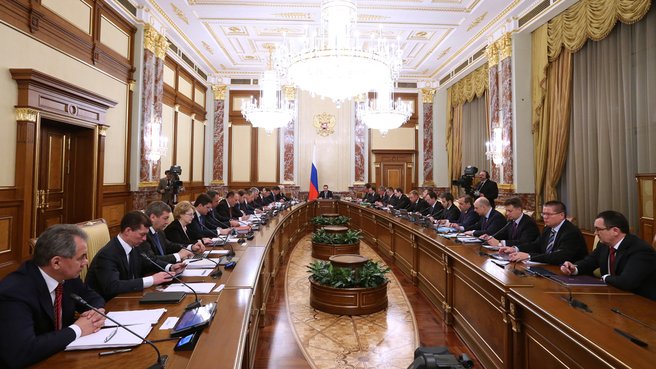The main item on the agenda: Russia’s food security in 2013 and the forecast for 2014.
Dmitry Medvedev’s opening remarks:
Good afternoon. I’d like to begin with one issue that is very important for a large number of our people. I’m referring to pensions. I’ve signed a resolution on adjusting social pensions starting 1 April. We do this every year taking into account the growth of the pensioners’ subsistence level on the basis of the law on pension support. This time the adjustment will amount to 17.1%. We’ve increased pensions of people with disabilities and participants in the Great Patriotic War and people who have been affected by radiation and other man-made disasters. Other social-related payments will go up as well. In value terms, the increase will be from 1,100 to 2,100 roubles.
We’ve allocated the necessary funds – over 40 billion roubles – in the budget for this year. As a result, 3.7 million people will receive inflation-adjusted pensions. So, we are steadily fulfilling our relevant commitments.
Dmitry Medvedev: "I’ve signed a resolution on adjusting social pensions starting 1 April. We do this every year taking into account the growth of the pensioners’ subsistence level on the basis of the law on pension support. This time the adjustment will amount to 17.1%."
Now let’s turn to the agenda. The first item is on the monitoring and condition of food security in 2013 and the forecast for the current year.
This is a very important subject, considering that expenses on food make up almost a third of all consumer expenses of the Russian family. We must create the conditions for producing the highest quality foods at home and making them affordable for our people.
Let me recall that the Doctrine of Food Security has been in effect since 2010. This year it has determined the main goals for the agro-industrial and fishing complexes and has specified a number of indicators that characterise our dependence on food imports.
Two state programmes – on the development of agriculture and fisheries management – are aimed at achieving these goals. A fairly efficient system of government support has been established in the past decade. It has changed in different periods but it has always produced results and helped agriculture. In general, it encourages investors to put money into agrarian businesses and create modern agrarian production.
Dmitry Medvedev: "The agricultural production index has reached 106.2% and the result for plant growing has been even better, at 112%. The doctrine’s forecasts on grain, sugar, vegetable oil and potatoes have been exceeded."
This policy is productive. I think the results of the past year have been fairly good. The agricultural production index has reached 106.2% and the result for plant growing has been even better, at 112%. The doctrine’s forecasts on grain, sugar, vegetable oil and potatoes have been exceeded. Moreover, we not only fully meet our grain requirements, we also export it.
That said, the situation remains complicated in several spheres. This primarily applies to dairy farming, which is a complicated subsidiary of agrarian production. Regrettably, last year its production decreased by over 3%. We recently (in February) discussed this problem at a teleconference. The Ministry of Agriculture was instructed to draft proposals on additional incentives for the development of this sphere, including mechanisms for stabilising prices on the milk market. There are other issues that affect our food security in various ways, and I suggest we discuss them on the basis of the report by the Minister of Agriculture.
Today we’ll also speak about measures to improve the business climate in urban development. These measures are put together in a special roadmap on improving legal regulation of urban development and upgrading the business climate in construction. The roadmap should become the main guideline for the construction industry. It is designed to make the work of developers, real estate agents and all other players on the market more convenient and efficient.
We’re hoping to simplify all construction procedures with the help of this roadmap – from design documentation to the commissioning stage. This will reduce the number of administrative procedures required for receiving permits for construction and the overall time for dealing with all kinds of administrative procedures.
A complete list of administrative procedures in construction will become a key element of the roadmap. Today those who make decisions on the spot, so to speak, compile a list of construction documents themselves. The unified registry of requirements that we’re drafting should rid developers of these regional particularities and, in some cases, from arbitrary decisions by the local authorities. I hope that this list will make the rules of the game on the construction market more clear-cut, understandable and transparent.
Let me recall that not only officials but also entrepreneurs and experts have been taking part in drafting this roadmap. I hope we’ll receive a comprehensive document. It will be submitted for your consideration.
Let’s start discussing our agenda.
The first item is on monitoring food security. Mr Fyodorov, go ahead please.
<…>











